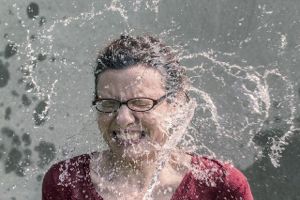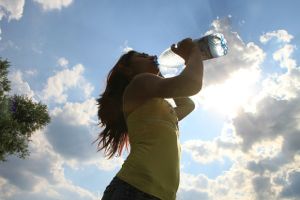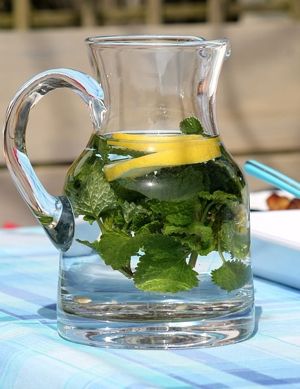Are you finding that you lack energy for writing?
Do you struggle to focus, or engage in a daily battle with brain fog?
If you find yourself feeling that way at the start of your designated writing time, there’s one thing that may help more than you think: drink a tall, cold glass of water.
Here’s why this simple technique will help you get back to work feeling fresh and attentive.
 Energy for Writing Tip 1. Water Helps Fight Fatigue
Energy for Writing Tip 1. Water Helps Fight Fatigue
If you’re dragging through your day or if you suddenly feel a little groggy, you may be slightly dehydrated.
Researchers reported in 2015 that a lack of enough water in the body was a common cause of fatigue. After surveying 300 general practitioners, they discovered that one in five patients had visited the doctor complaining of symptoms like fatigue that could be caused by failing to drink enough throughout the day.
Advisor to the National Hydration Council Dr. Roger Henderson told the Daily Mail that he often sees patients who complain of consistent tiredness.
“There are, of course, several reasons that could be causing this,” he said, “but a surprisingly common cause is that they are dehydrated.”
You may think that you need water only when you’re thirsty, but there are often other symptoms of dehydration that precede thirst, including tiredness, headaches, and poor concentration.
An earlier study found similar results. Two groups of women went through a series of tests on their mood and cognitive abilities, both at rest and when exercising. The first group had consumed enough fluids to remain optimally hydrated, but the second group was induced into a mildly dehydrated state—just one percent lower than optimal.
Results showed that those who were slightly dehydrated suffered from headaches, loss of focus, fatigue, and low mood.
 2. Drinking Water Gives You a Mental Boost
2. Drinking Water Gives You a Mental Boost
No one would deny that writing takes mental power. There’s too much to keep track of in a scene to manage it well when you’re experiencing brain fog.
Drinking a glass of water can help. In a 2010 study, researchers explained that water, or the lack of it, can influence cognition.
Even mild levels of dehydration can “produce disruptions in mood and cognitive function,” affecting concentration, alertness, and memory.
When participants drank water, the effects were reversed. Participants became more alert and experienced improvements in performing mentally challenging tasks.
In a 2012 study, researchers found that being dehydrated by just two percent impaired performance on tasks that required attention, psychomotor, and immediate memory skills.
A later small study also reported improved mental performance as a result of drinking plain water. People who drank about three cups of water before taking a series of cognitive tests performed better than those who didn’t drink the water.
 Energy for Writing Tip 3. You May Not Realize You’re Thirsty
Energy for Writing Tip 3. You May Not Realize You’re Thirsty
Most of us drink when we’re thirsty, but there is some evidence that suggests that’s not a reliable way to gauge our own hydration levels.
A 2013 study found that 43 percent of adults drink less than four cups a day. The Centers for Disease Control and Prevention (CDC) acknowledged that four cups is not enough to maintain proper hydration.
The Boston College estimates the problem to be even worse, stating that two-thirds of Americans don’t drink enough water. Administrative dietician Sheila Tucker, MA, RD states:
“Do not wait until you are thirsty to decide you might be dehydrated; you could already be down at least a pint! Besides thirst, headache, dry mouth, dark urine, and lethargy can be signs of dehydration.”
The general recommendation is 8 cups of water a day plus 1-3 cups for each hour of activity. Your best bet for optimal energy and brainpower is to count your cups rather than rely on thirst.
“People just think that when they start to get a little weak or they have a headache, they need to eat something,” Grace Webb, Assistant Director for Clinical Nutrition at New York Hospital, told Medical Daily, “but most often they need to drink.”
 Energy for Writing Tip 4. Women May Need It Even More
Energy for Writing Tip 4. Women May Need It Even More
Women writers may need to be even more vigilant in their consumption of water.
There is some evidence that women may be even more affected mentally by slight dehydration than men.
In a 2009 study, for example, men and women athletes were tested under dehydrated conditions. Whereas reaction times were stable for men both when well hydrated and not, women suffered delays when dehydrated.
Researchers reported in 2011 that just a little over one percent dehydration caused symptoms in women like lower concentration, decreased mood, and headaches, while whatever task the women had to do seemed more difficult than usual.
Men can also experience these effects, but research suggests that women are more sensitive to dehydration on the whole, and are more likely to experience fatigue and headaches.
“Even mild dehydration that can occur during the course of our ordinary daily activities can degrade how we are feeling – especially for women,” said researcher Harris Lieberman, “who appear to be more susceptible to the adverse effects of low levels of dehydration than men.”
 Energy for Writing Tip 5. Drinking More Water Can Reduce Stress
Energy for Writing Tip 5. Drinking More Water Can Reduce Stress
Sometimes it’s stressful to face the blank page. You may worry you’re not up to the task, or feel tense because you’re behind on meeting a deadline.
Drinking water may help calm you down.
Studies show that dehydration ramps up the stress hormone, cortisol, whereas drinking water and rehydrating the body does the opposite—reduces cortisol levels and eases anxiety.
Water is even suggested to college students who are facing final exams—those allowed to take a bottle of water into the testing area were found to perform better than those who weren’t.
The problem is that when you’re stressed, you’re less likely to drink water or to eat healthy in general. An increased heart rate causes the body to use up more water. You actually need to drink more when you’re feeling stressed just to stay at an even keel.
To feel more relaxed as you approach your writing project, make sure you have some water handy.
 To Gain Energy for Writing, Make Sure You’re Getting Enough
To Gain Energy for Writing, Make Sure You’re Getting Enough
It can be difficult during your busy day to be sure you’re drinking enough.
Try these tips to up your water intake, and no matter what, drink a full glass before sitting down to write.
- Start your day with a full glass of water.
- Take a bottle of water with you everywhere and sip throughout the day.
- Swap out at least one unhealthy drink (like soda) a day for a glass of water or sparkling water.
- Keep a pitcher of fresh, ice-cold water in the refrigerator. Add some fresh fruit or herbs to vary the taste.
- Make it a habit to drink eight cups of water a day. Set a time for each glass to help you remember.
- When you’re feeling hungry, drink a glass of water first. Thirst is often disguised as hunger.
- Drink a glass of water before meals—it not only helps you stay hydrated, but may help you maintain a healthy weight as well, as it encourages you to eat fewer calories.
- Always drink after exercising. Most experts recommend you drink before, too.
- When traveling, drink one glass of water for every hour of flight time.
Do you drink enough water each day?
Sources
An, J. McCaffrey, “Plain water consumption in relation to energy intake and diet quality about U.S. adults, 2005-2012,” Nutritional Epidemiology, February 22, 2016; http://onlinelibrary.wiley.com/doi/10.1111/jhn.12368/abstract;jsessionid=1E41BC19C2964E0F2A3FF21701F46D2A.f03t01.
Guneet Bhatia, “Fatigue Could be a Sign of Dehydration: Study,” IB Times, May 27, 2015, http://www.ibtimes.com/fatigue-could-be-sign-dehydration-study-1940357.
Sophie Borland, “Is dehydration the reason you’re tired ALL the time?” Daily Mail, May 25, 2015, http://www.dailymail.co.uk/health/article-3096702/Could-one-five-GP-visits-dehydration-New-study-claims-fatigue-epidemic.html.
Lawrence E. Armstrong, et al., “Mild Dehydration Affects Mood in Healthy Women,” American Society for Nutrition, December 21, 2011; http://jn.nutrition.org/content/early/2011/12/20/jn.111.142000.abstract.
Barry M. Popkin, et al., “Water, Hydration, and Health,” Nutr. Rev., August 2010; 68(8):439-458, https://www.ncbi.nlm.nih.gov/pmc/articles/PMC2908954/.
Rachael Rettner, “Drinking Water May Provide Mental Boost,” LiveScience.com, July 16, 2013, http://www.livescience.com/38212-drinking-water-mental-performance.html.
Sheila Tucker, “Two-Thirds of Americans Don’t Drink Enough,” Boston College, August 1, 2016, http://www.bc.edu/offices/dining/nutrition/topics/drinkenough.html.
Leslie Mann, “Study finds nearly half of Americans not drinking enough water,” Chicago Tribune, June 5, 2013, http://articles.chicagotribune.com/2013-06-05/health/ct-x-0605-drinking-water-20130605_1_dietary-guidelines-much-water-drinking-water.
John Ericson, “75% of Americans May Suffer from Chronic Dehydration, According to Doctors,” MedicalDaily, July 3, 2013, http://www.medicaldaily.com/75-americans-may-suffer-chronic-dehydration-according-doctors-247393.
Ana Adan, “Cognitive Performance and Dehydration,” Journal of the American College of Nutrition, April 2012; 31(2):71-8, https://www.researchgate.net/publication/230600141_Cognitive_Performance_and_Dehydration.
Rick Nauert, “Dehydration Influences Mood, Cognition,” PsychCentral, https://psychcentral.com/news/2012/02/20/dehydration-influences-mood-cognition/35037.html.
Lawrence E. Armstrong, et al., “Mild Dehydration Affects Mood in Healthy Young Women,” Journal of Nutrition, December 21, 2011, http://jn.nutrition.org/content/early/2011/12/20/jn.111.142000.abstract.
Linda Wassmer Andrews, “Can Sipping Water Make You Smarter?” Psychology Today, May 7, 2012, https://www.psychologytoday.com/blog/minding-the-body/201205/can-sipping-water-make-you-smarter.


Colleen, this has always been my health problem. I am constantly dehydrated. My headaches are mainly caused by dehydration and when I was living in Brazil, I ended up in the hospital twice in six months. Water is vital, we underestimate the importance of water; we are mostly made of it and we cannot let ourselves run out of water.
Oh that doesn’t sound good, Alessandro, especially in a warm climate. It is easy to forget, though. Sounds like a post-it reminder might be good for you!
I’ve always been good with hydration. In college, I was poor and that’s when I made the switch to drinking only water. Now I really don’t like flavored beverages at all. Aside from a morning cup of coffee with cream and sugar, more often than not, I have a water bottle with me. I don’t like it cold either. Room temperature is much better.
You caught on early, Jeri! I really got going when I took up yoga, but I find on heavy work days I still forget to drink enough.
This came at the right time–I’ve been really thirsty of late, which isn’t a good sign! I try to drink a lot of water, and am upping that. I love the defeating stress part with more water 🙂
And all summer I keep a pitcher of water in the fridge with all sorts of herbs and even cucumber, etc. So refreshing!
Sounds yummy, Susan! Yes, I’ve been crazy thirsty lately too. Not drinking enough!
Excellent information. Thank you. This is something I f=definitely need to look at.
“definitely” sorry for the typo.
Happy drinking (water) Dave! :O)